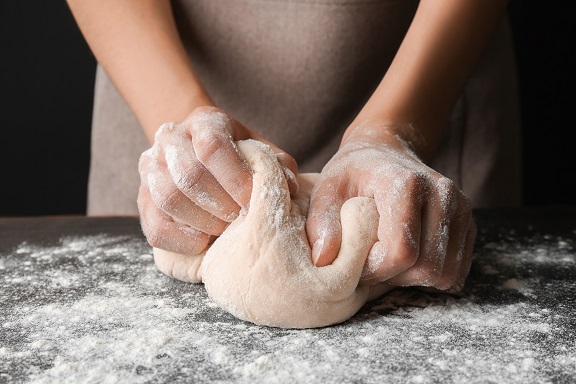Through the application of cutting-edge artificial intelligence and enzyme technology, EnzymoGenius™ is dedicated to improving the overall quality, taste, and shelf life of bakery products, thus catering to the evolving demands of the food industry. Our services span a spectrum of key steps in the baked goods production process, employing innovative techniques to ensure superior results.
Role of Phospholipase in Baking
Phospholipases are mainly used to catalyze lipid hydrolysis and play an integral role in the food baking process. These enzymatic agents are primarily responsible for the cleavage of phospholipids into their constituent components, namely fatty acids and glycerophosphates. Their significance in the context of baking stems from their profound influence on the structural and textural characteristics of baked products.

Improved Dough Elasticity and Crumb Softness
By catalyzing the hydrolysis of phospholipids, these enzymes release fatty acids, which actively participate in the formation of gluten networks. This results in the enhancement of dough elasticity, a critical factor in creating the desired textural qualities of baked products.

Impact on Flavor Profile
Beyond texture, phospholipases exert a notable impact on lipid oxidation, a factor that significantly influences the overall flavor profile of baked products. Their role in this process can enhance the sensory appeal and palatability of bakery items.
The principles underpinning phospholipase activity in baking are intricately connected to the specifics of enzyme-substrate interactions and the kinetics of lipid hydrolysis. Research in this field is concentrated on optimizing baking processes through the meticulous selection of suitable phospholipase variants, their precise concentrations, and the controlled management of baking conditions.
Products and Solutions Offering
Custom Products
- Substrate Specificity and Enzymatic Precision: Phospholipases can be finely tailored to target precise substrates within bakery formulations. This level of specificity allows for exceptional versatility, ensuring that our enzymes align precisely with the unique needs of your baking processes.
- Thermal Stability: Our meticulously engineered phospholipases showcase robust performance across a broad spectrum of baking temperatures.
- pH Tolerance: Engineered phospholipases exhibit resilience to varying pH conditions, ensuring consistent and desired results.
Custom Products
- Lipid Modification: Precise control of fat content, texture and sensory properties in bakery products.
- Dough Conditioning: Enhancing the extensibility and elasticity of dough, leads to improved bread volume and texture.
- Emulsification: Promotes the formation and stabilization of emulsions and ensures uniform distribution of ingredients. This contribution leads to improved crumb structure and an extended shelf life.
- Flavor Enhancement: Through the targeted hydrolysis of lipids, phospholipases unlock and enhance the flavors of baked goods.
- Nutritional Enrichment: We offer solutions for fortifying bakery products with essential nutrients, achieved by precise enzymatic reactions.
Services Process for Phospholipase Design and Optimization
1. Data Analysis: The process begins with the collection and analysis of vast datasets, encompassing enzyme properties, substrate interactions, and food processing parameters.
2. Algorithmic Design: Our algorithms leverage AI to create enzyme variants optimized for specific bakery applications, considering factors such as temperature, pH, and substrate compatibility.
3. Virtual Screening: Advanced virtual screening techniques are employed to identify the most promising enzyme candidates, ensuring efficiency and specificity.
4. Laboratory Validation: Selected candidates are synthesized and tested in the lab to validate their performance in real-world conditions.
5. Iterative Optimization: The process continues with iterative rounds of optimization, refining enzyme properties for maximal efficacy in bakery food processing.
Technical Advantages
- Cutting-edge Artificial Intelligence (AI).
Design and optimization of phospholipases for baked goods processing.
- Advanced Molecular Biology Techniques.
Including gene synthesis and cloning for enzyme production.
- High-Throughput Screening Tools.
Facilitate the rapid assessment of enzyme variants, accelerating the optimization process.
- Analytical Chemistry Techniques.
Such as mass spectrometry and chromatography for enzyme characterization and food product analysis.
- Computational Modeling.
Simulate enzyme-substrate interactions and predict optimal conditions.
With an unwavering commitment to precision and an unwavering spirit of innovation, CD Biosynsis offers a wide range of AI-driven enzyme-based solutions, exquisitely customized to harmonize with your unique requirements. Our profound expertise extends across food baking, brewing, dairy processing, vegetable and fruit processing, value-added by-products, and food ingredient development, among others. By leveraging the synergy of AI and synthetic biology, we provide unparalleled advantages, enhancing productivity and product quality. For inquiries and to explore the potential possibilities in food and beverage development, please feel free to get in touch with us.


































